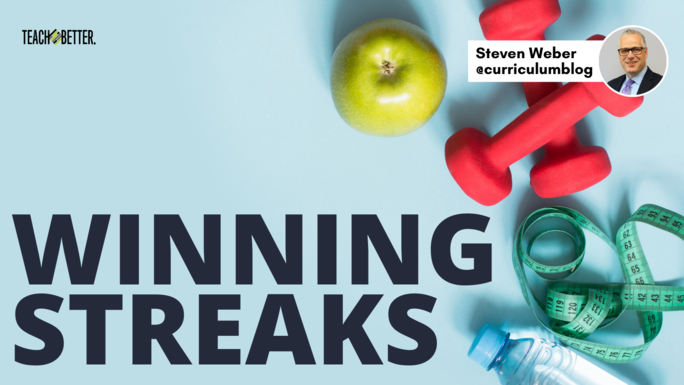TL;DR:
- Build winning streaks in each learner by using formative assessments, providing time for metacognition daily, and making adjustments to instruction.
- These “winning streaks” will provide students with the ability to succeed not only this school year, but in life.
During the pandemic, most students and educators focused on what was lost. It is human nature to face a crisis from a deficit mindset. While it is normal to grieve, vent, cry, and feel frustrated, at some point educators must focus on the future. Duke Men’s Basketball Head Coach Mike Krzyzewski (2010) said, “Don’t worry about losing. Think about winning.” How can school teams develop a game plan and start a winning streak that continues into the next school year?
When a team is in the middle of a winning streak, the players gain confidence and often perform at a higher level because they don’t want the streak to end. UCLA Men’s Head Basketball Coach John Wooden (2005, p. 56) said, “Success is peace of mind which is a direct result of self-satisfaction in knowing you made the effort to do the best of which you are capable.”
When students return to school, there will be a wide range of readiness levels within each classroom. A deficit-approach to teaching will focus on students who enter the classroom winning or losing. Teachers can quickly identify students who may be at-risk, off-track for graduation, or simply in a slump.
A strengths-based approach will focus on prior knowledge, student gifts, and the opportunity for growth. All learners can grow given the right learning environment, a coach, and the opportunity to play the game. This article addresses three strategies for building winning streaks for each learner.
Formative Assessment
When students return to school for onsite instruction, “rather than sorting students into winners and losers, assessment for learning can put all students on a winning streak” (Stiggins, 2007, p. 22). Assessment data allows students to establish goals and to monitor their progress. Student growth should be the emphasis, not mastery of the previous year’s learning objectives or state standards.
Following a global pandemic that disrupted the learning experience, it is unrealistic to believe that every learner will enter the next classroom prepared for success. However, when success is defined as student growth rather than a 4.0 GPA or demonstrated proficiency of the previous year’s key skills, then all students will have the opportunity to play the game and establish a winning streak.
The goal of every classroom should be to provide time for metacognition daily, rather than sprinting through standards or attempting to cover everything that students may have missed the previous year. Click To TweetMetacognition
“Metacognition is our ability to know what we know and what we don’t know. It is our ability to plan a strategy for producing what information is needed, to be conscious of our own steps and strategies during the act of problem solving, and to reflect on and evaluate the productiveness of our own thinking” (Costa and Kallick, 2021). In the locker room, coaches draw Xs and Os to put each player in a position to succeed.
When an athlete trains, he or she must focus on what makes a perfect performance. A figure skater may visualize a perfect 10 routine. In order for students to demonstrate key skills and transfer their understanding in new settings, it is important that they have a goal or an exemplar that shows what they are aiming for.
It is also critically important that teachers avoid scoring every first draft, brainstorming, educated guess, or project. If the figure skating coach scored every practice routine and then averaged the scores, the skater would not have a perfect 10. When students know the learning target and they have the opportunity to reflect on their thinking, it will create more winning streaks for each student.
The goal of every classroom should be to provide time for metacognition daily, rather than sprinting through standards or attempting to cover everything that students may have missed the previous year.
Make Coaching Adjustments
Kansas Jayhawks Men’s Head Basketball Coach Bill Self (2006) said, “There’s not many things less important than the score at halftime.” If students are struggling with the content and the key skills outlined in the district’s curriculum, teachers may need to call a timeout and adjust instruction.
The question to ask for students who have fallen several grade levels behind isn’t
“Can kids master essential grade-level standards?”
Instead, the question to ask is, “What can we do to get kids to
master essential grade-level standards?” (Mattos & Buffum in Ferriter, 2015).
Teachers modified and adjusted assignments throughout the pandemic. In order to build confident learners who can own their learning, learners will “need multiple opportunities to practice in risk-free environments, to receive regular and specific feedback related to progress against standards, and timely opportunities to use the feedback to re-do and improve” (Wiggins and McTighe, 2007). Winning streaks will provide students with the ability to succeed not only this school year, but in life.
References
Costa, A.L., & Kallick, B. (2009). Habits of mind: Strategies for disciplined choice making. Retrieved February 15, 2021, from https://thesystemsthinker.com/habits-of-mind-strategies-for-disciplined-choice-making/
Ferriter, B. (2015). Three lessons on intervention from Mike Mattos and Austin Buffum. Retrieved from Center for Teaching Quality on February 15, 2021, from https://www.teachingquality.org/three-lessons-on-intervention-from-mike-mattos-and-austin-buffum/.
Krzyzewski, M., & Phillips, D.T. (2010). Leading with the heart: Coach K’s successful strategies for basketball, business, and life. Warner Books, Inc.
Self. B. quoted in Wood, R. (2006, January 31). Kansas in thick of Big 12 race. KUsports.com. http://www2.kusports.com/news/2006/jan/31/kansas_thick_big_12_race/
Stiggins, R. (2007). Assessment through the student’s eyes. Retrieved February 15, 2021, from http://www.ascd.org/publications/educational-leadership/may07/vol64/num08/Assessment-Through-the-Student’s-Eyes.aspx
Wiggins, G., & McTighe, J. (2007). Schooling by design: Mission, action, and achievement. ASCD.
Wooden. J., & Jamison, S. (2005). Wooden on leadership. McGraw-Hill.
About Steven Weber
Dr. Steven Weber is the Associate Superintendent for Teaching and Learning with Fayetteville Public Schools (AR). His areas of research include curriculum design, formative assessment, professional learning, and school leadership.



